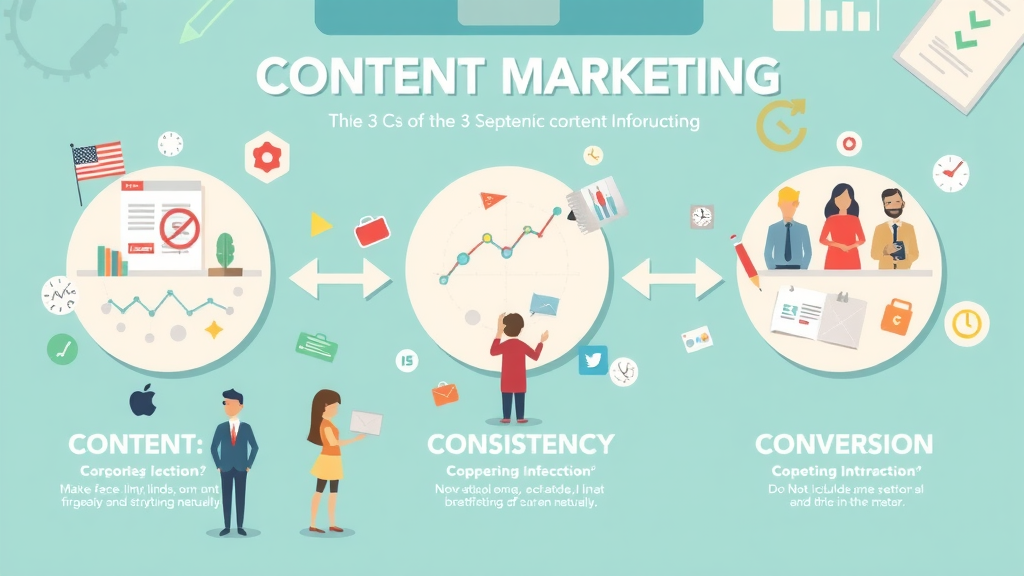
Did you know that companies who prioritize content marketing experience nearly six times higher conversion rates than those that don’t? Let’s break down the strategies fueling such explosive growth.
- In this comprehensive guide, you’ll learn:
- The fundamentals of content marketing and its transformative power
- Proven content marketing strategies for immediate impact
- How social media and blog posts fuel brand awareness
- How to measure and optimize your return on investment
Content marketing isn’t just a buzzword—it's a proven driver of brand awareness , trust, and sales. Whether you’re a small business owner or a seasoned marketer, understanding content marketing is the first step to unlocking the explosive growth your company deserves. Keep reading to gain actionable insights and industry secrets that professionals use to attract and retain loyal customers!
Understanding Content Marketing: Driving Results through Connection

Content marketing is more than just crafting blog posts or updating your social media. At its core, content marketing is about building genuine connections with your target audience through valuable, relevant, and consistent media content. By delivering the right types of content at each stage of the customer journey, you not only attract potential customers but also guide them toward trusting your brand and eventually becoming loyal buyers. The real power lies in knowing how to use content to educate, inspire, and gently lead prospects down the sales funnel—without feeling pushy or overly sales-focused.
Think about your favorite brands or blogs. What draws you in time and time again? Likely, it’s their knack for producing quality content that resonates with your interests and needs—whether that's through a well-timed social media post, an informative blog post, or a captivating video content series. This approach doesn’t just build trust ; it converts readers into followers, subscribers, and champions who drive word-of-mouth and repeat business. Content marketing works because it puts the potential customer first, focusing on solutions and value, not just the product or service.
What is content marketing exactly?
Content marketing is a strategic approach focused on creating and distributing valuable, relevant, and consistent content—that could be a blog post, white paper, video, or social media post—to attract and retain a clearly defined audience. Unlike traditional advertising, content marketing isn’t about the hard sell. Instead, it’s about offering insights, entertainment, or education that solves problems or fulfills needs for your audience. This builds loyalty and makes your brand the go-to solution when potential customers are ready to buy.
Rather than interrupting with ads, content marketing quietly puts your message in the places your audience already spends time, like informative blog posts, engaging video content, or practical email marketing drips. As your visibility grows, so does trust and authority, positioning you ahead of competitors who rely strictly on traditional methods.
The 3 C's of content marketing: Content, Consistency, and Conversion

When diving into content marketing, three core principles stand tall: Content, Consistency, and Conversion. It starts with creating high-quality content —whether that’s long-form articles, white papers, engaging videos, or media posts—that directly meets your target audience’s needs. The next key is consistency : showing up regularly with content across channels such as social media, blogs, and email marketing. When your audience can depend on you for valuable insights, trust builds over time.
The ultimate goal is conversion : guiding your engaged readers or viewers towards taking action—subscribing to your newsletter, downloading a resource, making a purchase, or sharing your message. All three elements work together in a content marketing strategy to foster lasting audience relationships, drive business growth, and maximize your return on investment.
Why Content Marketing Outperforms Traditional Methods
Content marketing has surpassed traditional advertising in effectiveness because audiences crave authenticity and value over intrusive persuasion. Unlike a straightforward media marketing campaign or paid ad blitz, content marketing delivers ongoing education, entertainment, and solutions, positioning your brand as a trusted advisor rather than just another seller. This trust, in turn, shortens sales cycles and increases the likelihood that your message resonates in a crowded digital marketplace.
Furthermore, content is long-lasting. A well-crafted blog post, media post, or video content can continue to generate search engine traffic, leads, and awareness long after its initial publication—unlike fleeting TV or print ads. By creating a library of insightful, evergreen form content, your company attracts and retains a loyal base of potential customers, all while spending less than traditional media campaigns demand.
Foundations of a Content Marketing Strategy
A successful content marketing strategy doesn’t just happen—it’s the result of careful planning, ongoing measurement, and relentless optimization. To drive meaningful results, brands must understand their audience, craft clear content objectives, and develop a mix of media content that resonates at different stages of the buyer’s journey. Let’s break down how you can create a roadmap for sustainable growth with content marketing.
How to Craft a Winning Content Marketing Strategy
- Set measurable content goals: Define explicit objectives, like increasing web traffic, growing email subscribers, or boosting conversion rate.
- Identify your target audience: Understand their pain points, interests, and where they spend time online.
- Develop your unique brand story: Craft a distinct voice and mission that differentiates your content.
- Plan and schedule all campaign components: Use a content calendar to ensure consistency across channels like blog posts, social media content, and email marketing.
- Use analytics to adapt and improve: Monitor KPIs regularly and make data-driven decisions to optimize your content marketing strategy.
Each step is critical. Setting clear intentions and understanding your audience ensures every blog post, video, or email marketing campaign moves you closer to your goals, while analytics keep your team focused on what works.
Core Elements of an Effective Content Strategy

A robust content strategy integrates several foundational elements: buyer personas, topic clusters, an editorial calendar, and a defined brand voice. Creating buyer personas clarifies who you’re writing for and what content will resonate most—vital for any form content, whether it’s a blog post, white paper, or social media post. Developing topic clusters and mapping content to buyer stages helps you offer solutions tailored to where potential customers are in their buying process.
Equally important, a content strategy must include a publishing schedule and a diverse mix of channels—leveraging video content, media posts, and emails to engage customers where they’re most active. Ongoing analysis ensures your strategy evolves as audiences and platforms change.
KPIs and Metrics: Measuring Return on Investment
Tracking performance through KPIs (Key Performance Indicators) is essential to prove the effectiveness of your content marketing strategy. Consistently measuring metrics such as traffic, lead quality, and engagement rates reveals what resonates with your audience and where your marketing strategy needs adjustment. Ultimately, it’s about knowing how much return on investment (ROI) your content delivers and identifying high-performing content to inform future marketing campaigns.
| Metric | Description |
|---|---|
| Website Traffic | Number of visits attributed to content |
| Engagement Rate | Social shares, comments, and likes |
| Lead Generation | New qualified leads from content |
| Conversion Rate | Actions taken after consuming content |
| Customer Retention | Repeat visits and retention percentage |
Types of Content Marketing: Exploring All Major Channels

There’s no one-size-fits-all approach to content marketing ; the magic lies in experimenting with varied types of content and discovering what connects with your audience. From quick social media posts and snackable video content to in-depth blog posts, ebooks, and white papers, each form content serves a unique role. A balanced content marketing strategy includes a blend of channels and formats, ensuring you reach potential customers in the places—and with the methods—they respond to best.
Overview of Types of Content: From Blog Posts to White Papers
- Blog posts
- Video content
- Social media posts
- Email marketing
- Infographics
- Podcasts
- Ebooks
- White papers
Each content type offers distinct benefits. Blog posts drive search engine visibility and educate, while white papers and ebooks build authority and attract leads seeking in-depth knowledge. Social media posts and video content create instant engagement, drawing in those who prefer visual or interactive experiences. Email marketing is crucial for nurturing leads and keeping your brand top-of-mind.
Creating Engaging Blog Post Series
Developing a series of blog posts around a central topic not only boosts your search engine ranking but also offers returning visitors a reason to come back for more. When planning a blog post series, ensure each piece stands alone but also forms a cohesive narrative with the rest. Use subtopics and address pain points frequently searched by your target audience.
Consistency is key—whether it’s publishing a fresh post every week or creating evergreen reference content. Linking related blog posts within the series encourages deeper exploration, increases time on site, and steadily builds trust with your potential customers.
Leveraging Video Content to Expand Your Reach
Video content is exploding—shorts, explainers, interviews, and tutorials dominate social media feeds and search engines alike. Videos generate higher engagement rates than text alone, making them a valuable asset for any brand seeking wider reach or wanting to deliver complex ideas simply. You can repurpose core information from blog posts or white papers into dynamic, shareable video shorts or webinars to meet your audience’s preferences.
Platforms like YouTube and TikTok extend your brand’s presence, while embedding videos in blog posts or sharing via email marketing creates multi-channel touchpoints for repeat engagement and recall.
Social Media Content: The Power of Instant Connection

Timely, relevant social media content can catapult your brand into trending conversations and skyrocket brand awareness . Unlike other channels, social media lets you interact directly—with real-time responses, polls, behind-the-scenes looks, and quick Q&As. Prospective customers can engage instantly with your media posts, helping to build trust and loyalty faster than almost any other platform.
The diversity of media content—from image carousels on Instagram to thought leadership threads on Twitter or in-depth video content on Facebook—lets you tailor your marketing strategy to match both campaign goals and audience mindset. Every social media post is an opportunity for two-way conversation, community-building, and viral sharing.
Why White Papers Still Matter in Content Marketing
While quick media posts and blog posts grab attention, white papers remain invaluable for reaching B2B audiences and high-intent prospects. These in-depth documents showcase expertise, provide actionable solutions, and help attract and retain potential customers seeking specific answers. White papers often form the backbone of lead-generation campaigns—offered in exchange for contact details—which makes them vital for demonstrating the value of your product or service in complex industries.
They also fuel long-form content repurposing—turning core insights into shorter blog posts, infographics, or video summaries—and drive steady, qualified leads over time.
Watch a dynamic visual breakdown of what makes a cross-channel content marketing campaign deliver maximum impact, from brand storytelling to multi-platform optimization.
Choosing the Right Marketing Strategies for Content Success
Selecting the right marketing strategies hinges on your goals, audience preferences, and resources. Combining tactics for media content creation, social media engagement, influencer collaborations, and data-driven optimization can dramatically improve your ROI. Align your approach with the customer’s decision-making journey for content marketing that truly moves the needle.
Marketing Strategies That Drive Results
- Audience segmentation and personalized content
- Content repurposing across multiple channels
- Strategic use of influencer and expert guest posts
- Automated email marketing sequences
- Monitoring industry trends for relevant topics
Start by dividing your audience into meaningful segments, tailoring email marketing or blog post topics to their unique interests. Repurpose high-performing form content across media—from turning webinars into video content for YouTube, to extracting quotes and stats for social media posts. Collaborate with influencers whose audiences mirror your target customers, enhancing credibility and reach.
How to Increase Engagement with Media Content
Boosting engagement means blending compelling storytelling with interactive elements: use polls, live Q&As, dynamic infographics, and short videos. Ensure your branding, message, and call-to-action are unmistakable in each touchpoint—regardless if it’s a media post, email, or blog post. Analyze what sparks the most interaction, and double down on those formats to continually evolve your content marketing strategy.
"The best marketing doesn't feel like marketing." – Tom Fishburne
Integrating ROI-Focused Social Media Content

To maximize your return on investment , focus on high-value social media content that prompts action—be it newsletter signups, downloads, or direct sales. Use analytics to spotlight which posts drive conversions and which only build awareness. Integrate tracking links and call-to-actions in every post to tie social media campaign performance directly to results, rather than vanity metrics.
Continuous testing—experimenting with different formats and posting times—helps refine your marketing strategy, ensuring spend and effort generate measurable business outcomes.
Email Marketing: Nurturing Leads through Valuable Content
Email marketing bridges the gap between initial interest and loyal advocacy. Effective email campaigns don’t just promote, they deliver value —offering tips, exclusive content, or early product access. Segment your mailing list so each recipient receives content relevant to their stage of the journey, ensuring higher open and conversion rates.
Automating nurture sequences—timed follow-ups after a blog post subscription, webinar signup, or white paper download—can keep leads warm without extra manual effort. Over time, valuable, personalized email content builds trust and primes recipients for conversion.
Becoming a Content Marketer: Skills, Tools, and Career Path
In today’s digital landscape, a content marketer is an indispensable asset to any organization. This role revolves around content creation , strategic planning, and measuring the outcomes of diverse marketing campaigns. But what does it actually take to succeed in this dynamic field, and how does one start on this career path?
What does a content marketer do?

A content marketer wears many hats: researcher, writer, editor, strategist, and analyst. Day-to-day, they create compelling blog posts, social media posts, and other types of content designed to attract and retain potential customers. They draft campaign calendars, collaborate with designers on infographics and video content, coordinate with SEO and analytics teams, and monitor campaign performance to optimize results.
Content marketers also represent the brand voice, ensuring all published content—be it a simple blog post, engaging social media content, or an authoritative white paper—aligns with the company’s strategy and messaging guidelines.
Essential Skills for a Successful Content Marketer
- Creative copywriting
- Strategy development
- Data analysis
- Social media expertise
- SEO and search optimization
- Multimedia production
Succeeding as a content marketer means mastering the art of storytelling, interpreting analytics, and staying ahead of marketing trends. A strong foundation in SEO and platform best practices—plus the willingness to learn and adapt—sets great content marketers apart from the rest.
How do I become a content marketer?

Breaking into the world of content marketing requires both passion and practical steps. Start by developing a portfolio (even personal blog posts or social media campaigns count!) and learning basic marketing and analytics skills. Formal training helps, but experience—such as internships, volunteering for blog content management, or freelance writing—matters just as much.
Stay curious and invest in ongoing learning: follow industry leaders, complete short courses on content creation and marketing strategy, and experiment with different types of content. Over time, building connections and a strong online presence will open more doors and set the stage for long-term success as a content marketer.
People Also Ask About Content Marketing
What is content marketing exactly?

Content marketing is a strategic approach to creating and distributing valuable, relevant, and consistent media content —such as blog posts, videos, and social media content—to attract and engage a target audience, ultimately driving profitable actions. It’s fundamentally about helping, not just selling, which builds trust and loyalty with potential customers.
What are the 3 C's of content marketing?
The "3 C's" are Content (creating quality, useful assets), Consistency (publishing regularly to remain top-of-mind), and Conversion (turning engaged followers into paying customers or advocates).
What does a content marketer do?
A content marketer plans and executes content creation across multiple channels, analyzes performance, and refines strategies to achieve business goals. Their responsibilities range from writing blog posts and orchestrating social media posts to managing video content campaigns and white paper development.
How do I become a content marketer?
To become a content marketer, build a strong portfolio, learn core marketing strategies, and gain hands-on experience through personal projects, internships, or freelance work. Ongoing learning in digital trends, SEO, and content creation is key to standing out in the field.
Frequently Asked Questions about Content Marketing
Can content marketing work for any industry?
Absolutely. Content marketing delivers value to every industry, from tech startups and healthcare firms to restaurants and retail. The secret is adapting your approach to suit your audience’s needs, interests, and preferred platforms.
How long does it take to see results from a content marketing strategy?
While some results—like increased website traffic from a viral blog post or trending media post—can appear quickly, sustained brand awareness, trust, and substantial ROI usually take several months. Consistency and continuous improvement are vital for long-term impact.
Unlock Explosive Growth with Strategic Content Marketing
- Focus on content quality and consistency
- Regularly refine your content marketing strategy
- Leverage data to drive improvements
- Align content with business and customer needs
“Content is the atomic particle of all digital marketing.” – Rebecca Lieb
Ready to Elevate Your Brand Growth?
Take action today: invest in quality content marketing, measure your efforts, and watch your business experience real, explosive growth. Start sharing valuable stories and let your brand’s impact soar.
To deepen your understanding of content marketing and its impact on business growth, consider exploring the following resources:
-
“What Is Content Marketing?” by the Content Marketing Institute offers a comprehensive definition and insights into how content marketing supports the bottom line and addresses customer needs. ( contentmarketinginstitute.com )
-
“Content Marketing: The Ultimate Guide” by Forbes Advisor provides an in-depth look at content marketing strategies, their importance, and steps to create an effective content marketing plan. ( forbes.com )
These articles will equip you with actionable strategies and a deeper understanding of how to leverage content marketing for your business’s success.
 Add Row
Add Row  Add
Add 

Write A Comment